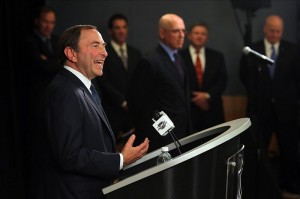
As we languish in the midst of the sixth week of the lockout between the National Hockey League and its players, a common question has emerged.
Why are we stuck in this deadlock?
After over a month, with the fate of the season hanging in the balance, neither side appears to be ready to budge. As a result, it’s becoming increasingly likely that not only will there not be a full 2012-13 regular season, but there may not be a season at all.
A fairly simple understanding of why this may be the case can be found in the realm of game theory. More specifically, in a quick glance at the prisoner’s dilemma, as formulated by Canadian mathematician Albert W. Tucker.
THE PRISONER’S DILEMMA
At its core, the dilemma is rather simple. Two individuals are arrested and held separately. Each is offered the following deal: if they turn informant on the other, they’ll go free and the other person will get a large jail sentence. If they don’t cave and turn informant, they’ll each get a lighter sentence for refusing to cooperate. But if both of them inform on each other, they’ll each get a medium-length sentence. If each individual assumes that the other person is going to inform on them, their best option is to also inform (a choice between a medium and a large jail sentence). If each individual assumes that the other person is not going to inform on them, their best option is still to also inform (a choice between no sentence and a light jail sentence). (Informing on the other person is known as a “dominant strategy” in this situation.)
From the perspective of the lockout, the incentives for each side can be framed like this:
- If both the NHL and NHLPA cooperate, a deal will be made rather quickly, but it’s unlikely that either side will get entirely what they want as each has to move off their “core” position a bit. But there’s no (or very minimal) lost revenue for either side as a result of any stoppage, as well as minimal fan and sponsor blow-back.
- If neither side cooperates several games (if not the whole season) will be lost. For the NHLPA, this means lost pay for its members and a potential loss of future revenue (NHL salaries are partially based on past performance and expectations of future performance, and players who haven’t played in awhile could be expected to be rusty and less good at hockey). Similarly, the NHL owners face a loss of game-related revenues as well as the potential for lost sponsorships and the loss of future game-related revenues, in that repeatedly cancelling games could cause fans to tune out of hockey when it returns.
- The ideal situation for either side, however, is that their opponent caves and gives them a good deal, and ideally does so quickly, so as to minimize any fan or sponsor blow-back over lost games.
THE NHL PERSPECTIVE
From the perspective of the National Hockey League owners, the ideal situation is that the players cave and cave quickly. Despite the loss of revenue due to the 2004-05 lockout, the NHL owners likely perceive the outcome of that labour impasse as the union caving. The NHLPA claimed that they would not accept a salary cap during the last stoppage. Fast-forward to the end of the lockout and that’s exactly what happened. The NHLPA accepted a salary cap and the NHL got the cost certainty that they wanted.
As a result, the NHL owners probably expect the players to cave once again. Therefore, the optimal course of action for the owners is to simply wait out the union and not budge off of their hard-line stance. If they do this and the union cooperates (or “caves”), they get what they wanted like last time. If the union doesn’t cooperate right away, the NHL owners save on a year of paying the players and probably arrive at an eventual compromise deal somewhere down the line that’s better than the existing agreement.
THE NHLPA PERSPECTIVE
Now, if you’re the NHLPA and you know that the perception is that you caved last time around, you’re going to try to choose an optimal strategy presuming that the other side is going to dig in and hope you cave again.
If the NHLPA expects the owners to dig in and try to wait them out – just like last time – what’s their best option? They’ll try to wait them out, too, and hope that the NHL has a division in their ownership (just like in the 1994 lockout) and cracks from within, causing their side to cave.
As a result, the NHLPA’s strategy appears to be akin to triggering a staring contest with the NHL owners and hoping against hope that the other side will blink first.
AND NOW, A DEADLOCK
Based on the past, each side expects the other side to cave sooner or later. As a result, the optimal strategy for each is to dig in and wait for the other side to crack. Given these likely optimal strategies, the lack of major compromise by either side shouldn’t shock anybody.
However, the length of the deadlock can be estimated with a bit of simple math.
Once the gains to be won from a new deal are less than the losses from waiting the other side out, each side gradually becomes indifferent towards waiting even longer or conceding. However, considering that neither side can really agree on what constitutes hockey-related revenues, the internal calculations for each side in terms of deciding where the “indifference point” is reached are anybody’s guess.
Of course, these calculations completely ignore the third party to this dispute, the fans, who are power-less in the current decision-making structure.